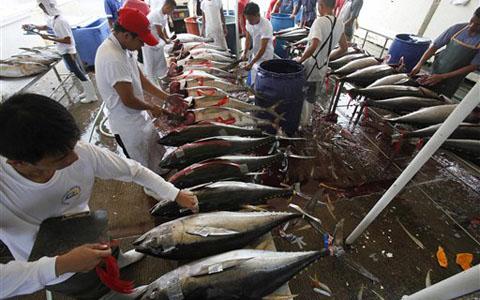PHL-EU free-trade pact ‘catastrophic’ for 1.8 million Filipino fishermen–group

Business Mirror | 29 Jan 2014
PHL-EU free-trade pact ‘catastrophic’ for 1.8 million Filipino fishermen–group
Written by Jonathan L. Mayuga
The Pambansang Lakas ng Kilusang Mamamalakaya ng Pilipinas (Pamalakaya) on Wednesday warned the Aquino administration against entering into a bilateral free trade agreement (FTA) with the European Union (EU), saying the forging of such an agreement will lead to the flooding of imported fish from EU member-states.
This, the group said, will further worsen the situation of small fishermen across the country. Quoting a study made by Philippine Institute for Development Studies (PDIS), Pamalakaya Vice Chairman Salvador France said small fishermen in the Philippines will face increasing competition with highly subsidized and cheap fish imports from European countries.
According to PIDS: “Potential losers are the small-scale fishermen who will face lower prices for their catch due to increased competition from imported fish and small-scale fish processors and marketing agents, including women, who will also face lower prices for their products.” Pamalakaya’s France argued that the that upcoming Philippine-EU free-trade agreement would result to elimination of tariffs between the Philippines and EU and this increase the quantity and exports of fisheries products to the Philippines. This would result economic losses and destruction of livelihood to 1.8 million subsistence fishermen and the 8 million people dependent on local fishing industry, he added.
The PIDS study however, argues that imports of aquaculture, pearl culture and pearl-gathering products will decrease and will improve the balance of trade, while imports of processed fish products and seaweeds will increase, which will lower the balance of trade, asserting further that in percentage terms, the fall in imports of fisheries products is highest among aquaculture, while the increase in imports is highest for processed products.
“The government should back off from entertaining a new free-trade deal with Europe. It is an invitation to catastrophe that would inflict pain and hardships to 1.8 million small fishermen and 8 million dependents to local fishing industry. We are talking here of more than 10 percent of the population relying mainly on the livelihood the local fishing industry provides,” France said.
Pamalakaya said about 900,000 metric tons (MT) of imported fish enter the country annually. In 2011 marine product imports reached 800,000 MT, of which 60 percent is galunggong (round scad fish).
The group said the landing cost of the locally produced fish is P40 per kilo, but those from China, Taiwan or Japan is only P20 ($0.465) per kilo. The group said institutional buyers and local fish traders will buy heavily subsidized foreign fish products because these are 50-percent cheaper than the locally produced ones, which are battered by the high cost of production.
Pamalakaya said with the new free- trade deal with Europe, the country will be flooded with other species of fish stuff, such as salmon, and other fish produced by member-states of the EU.
Pamalakaya said there is no need to import fish from other countries, adding that the 1.8 million fulltime and part-time work force in the fisheries sector can produce and meet the fish needs of 99 million Filipinos, and there is no need to rely on heavy importation.
The average annual production growth rate within that period was at 5.8 percent. In 2010 the total volume of fisheries production was 5.162 million metric tons (MMT) and grew by 1.61 percent. Pamalakaya said the Philippines ranked sixth among the top fish producing countries in the world with its total production of 4.97 MMT of fish, crustaceans, mollusks and aquatic plants, including seaweeds.





